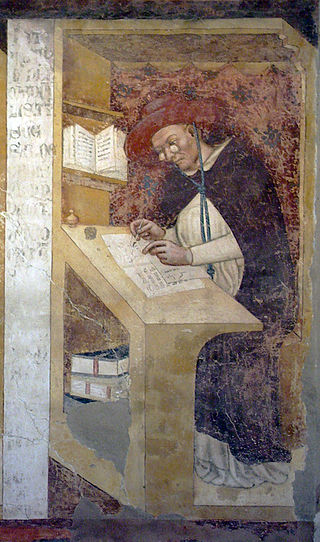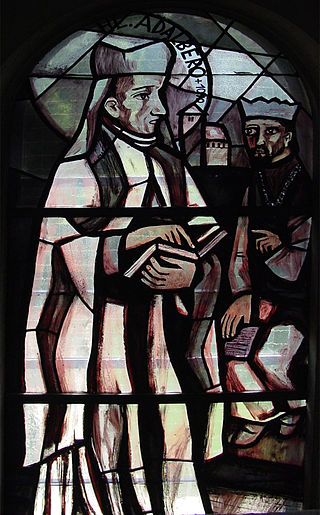Related Research Articles

Asti is a comune (municipality) of 74,348 inhabitants (1–1–2021) located in the Italian region of Piedmont, about 55 kilometres east of Turin, in the plain of the Tanaro River. It is the capital of the province of Asti and it is deemed to be the modern capital of Montferrat.

Anatolius was a Patriarch of Constantinople. He is regarded as a saint, by both the Orthodox and Roman Catholic Churches.
Fravitta, also known as Fravitas, Flavitas, or Flavianus II, was the patriarch of Constantinople (489–490).

Hugh of Saint-Cher, O.P. was a French Dominican friar who became a cardinal and noted biblical commentator.
The Councils of Carthage were church synods held during the 3rd, 4th, and 5th centuries in the city of Carthage in Africa. The most important of these are described below.

Pudens was an early Christian saint and martyr. He is mentioned as a layman of the Roman Church in 2 Timothy 4:21.
Anastasius I of Antioch was the Patriarch of Antioch twice.

Adalbero of Würzburg was Bishop of Würzburg and Count of Lambach-Wels.

Laurentius Surius was a German Carthusian hagiographer and church historian.

Amadeus of Portugal, born João de Menezes da Silva, was a Portuguese nobleman who became first a Hieronymite monk, then left that life to become a friar of the Franciscan Order. Later he became a reformer of that religious order, which led to his founding of a distinct branch of the Friars Minor that was named after him, but later suppressed by the Pope in order to unite them into one great family of Friars Minor Observants (1568).
The March of Ivrea was a large frontier county (march) in the northwest of the medieval Italian kingdom from the late 9th to the early 11th century. Its capital was Ivrea in present-day Piedmont, and it was held by a Burgundian family of margraves called the Anscarids. The march was the primary frontier between Italy and Upper Burgundy and served as a defense against any interference from that state.

Johann Christoph Wolf was a German Christian Hebraist, polymath, and collector of books.
In the early Christian Church, lapsi were apostates who renounced their faith under persecution by Roman authorities. The term refers to those who have lapsed or fallen away from their faith, only to return to it later.

François Nicholas Madeleine Morlot was a French prelate of the Catholic Church. He was Archbishop of Paris from 1857 until his death. He was previously Bishop of Orléans from 1839 and then Archbishop of Tours from 1843.
Martial Auribelli was a French Dominican. He was head of his Order from 1453 to 1462, when he was deposed in favour of a papal candidate, Conrad of Asti. He was again Master-General from 1465 to 1473.

Saint Chrysoliusthe Armenian is the patron saint of Komen/Comines, today in Belgium and France; his relics were venerated in the basilica of St Donatian, Bruges.
Abel Minard was an American industrialist and entrepreneur. He established the Minard home in Morristown to provide education for female orphans of Methodist foreign missionaries and clergymen.
Cosme de Villiers de Saint Étienne (1683–1758) was a French Carmelite bibliographer.
Egidio Foscarari O.P. was an Italian Dominican theologian who was Bishop of Modena (1550-1564).
References
- ↑ McClintock, John (1889). Cyclopaedia of Biblical, Theological, and Ecclesiastical Literature. Harper & brothers. p. 68.
- ↑ "Conrad of Asti from the McClintock and Strong Biblical Cyclopedia". McClintock and Strong Biblical Cyclopedia Online. Retrieved 2023-02-28.